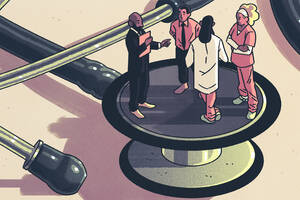Operations Jan 4, 2016
Going Green Can Be Good for the Bottom Line
Sustainable operations and greater growth can go hand in hand.

Yevgenia Nayberg
These days, almost every company supports the idea of a greener planet. Most acknowledge the ethical case for building supply chains that conserve energy and cause less environmental damage.
At the December 2015 Paris Climate Conference, nearly every nation in the world announced their plans to cut domestic greenhouse gas emissions. In the coming years new national climate policies will inevitably shift how businesses operate. The sooner companies align their operations with this trend, the better they will do at turning the challenge of growing while reducing emissions into a competitive advantage.
But according to Ozge Islegen, an assistant professor of managerial economics and decision sciences at the Kellogg School, there is increasing awareness that it also makes good business sense to design one’s operations around social and environmental sustainability. With the rising cost of raw materials, shifts in stakeholder expectations, increasing complexity of global supply chains, and new government standards (including the U.S.’s Clean Power Plan and the U.N.’s commitments to fight climate change), reducing one’s impact on the environment is more than just a public service—it is becoming part of the value proposition.
“Everyone recognizes that this is the direction we need to go,” Islegen says. “Now it’s a matter of making environmental performance a part of corporate strategy. And we find that there actually are strategic reasons to build sustainable operations. It might even give you an edge.”
Becoming an Industry Pioneer
There has always been at least one incentive for companies to focus on environmental performance: avoiding negative publicity. And with the explosion of social media, that incentive has only strengthened. Any news of severe pollution or lax environmental standards will spread instantaneously—and leave a mark. Volkswagen found this out after designing engines to cheat on emissions tests in 11 million of its diesel cars. The company is now reeling from customer anger, product recalls, and plummeting shares, not to mention fines worth billions of dollars.
At the same time, business leaders are learning that clean operations and higher growth can go hand in hand. Now that customers, investors, activists, and even a company’s own employees are voicing concerns about environmental impact, a greener record does more than simply guard against public-relations disasters. It can bolster a firm’s reputation.
Companies that improve their environmental performance need not surrender competitive advantage.
Even in cases where a sustainable operations strategy drives up costs, the advantages that come with a good reputation can go a long way towards offsetting those costs. Becoming an industry pioneer, for example, can strengthen a firm’s appeal among potential customers and partners, and grant that firm a prominent voice in global civil society—all of which ultimately serves the business. The outdoor apparel company Patagonia is one such industry leader. In 2010, Patagonia helped found the Sustainable Apparel Coalition, an alliance of 30 companies from the clothing and footwear industries.
“Companies that improve their environmental performance need not surrender competitive advantage,” Islegen says.
Keeping Up with Regulation
Beyond concerns about reputation, there is also much to be gained by staying ahead of regulations. “With so many people paying attention, and with governments feeling the need to act, more regulations are sure to come,” Islegen says. “From an operations perspective, it helps to be prepared.”
Part of being prepared means helping to establish industry standards. Coca-Cola, for example, has announced that it is working with its suppliers to increase water-use efficiency. The chief sustainability officer of Tiffany’s recently called for more accountability in global mining operations. At this year’s climate-change conference in Paris, several companies—including shipping giant UPS and Levi’s, the iconic clothing company, voluntarily pledged to reduce carbon emissions from their operations over the next five years.
Islegen sees such moves as being strategic as well as ethical. By cooperating with NGOs and nonprofit groups, companies can learn to adapt early to shifts in stakeholder interests, and put themselves in a position to help create—rather than react to—new regulations. Take, for example, Intel’s recent social-sustainability initiative. The company helped create an industry-wide auditing program to trace the source of precious metals and ensure that none are extracted from mines controlled by armed groups. By working together with a third party, Intel is able to get a better look at its own supply chain while staying ahead of an issue that matters to governments, human rights organizations, and ordinary citizens.
Of course, being fully transparent is not as straightforward as it seems. Given the complexity of global supply chains, it takes a highly coordinated effort to ensure that every supplier’s record is up to industry standards. Islegen says this is part of taking sustainable operations seriously.
“Environmental impact is not the easiest thing to measure,” she says, “but the move towards greater transparency is positive. As this trend continues, it might be the case that those [supply-chain partners] who are willing to disclose information will be more likely to be selected by companies.” Walmart, for example, has created its own sustainability index in cooperation with the Sustainability Consortium, an independent organization, which makes it easier to find products that were made through sustainable operations.
In light of this challenge, companies might also reconsider the way they deal with watchdog groups and environmental activists. “You can learn a lot from these groups,” Islegen says, “but only if you engage them. If you fail to engage them, you learn nothing, and they will eventually turn against you.”
A Comprehensive View
Finally, there may be certain parts of the business—or particular markets—where changes that lead to a leaner, more efficient, or more reliable supply chain can also make for a more sustainable supply chain. That is why it is critical to take a comprehensive approach to environmental performance, leaning heavily on new technologies and advances in data analytics to put every stage of the supply chain under the sustainability microscope.
“When you monitor your supply chains closely,” Islegen says, “you sometimes find that what may have seemed environmentally friendly at one point in the supply chain may not be when you look at its impact overall,” she explains. “But you also find opportunities.”
In other words, the same institutional vigilance that guarantees greener operations can also help companies identify inefficiencies in the supply chain—and places where changing how business is done can help both the environment and the bottom line.
For one, companies can certainly benefit from a more efficient and cost-effective use of raw materials—especially as prices rise. Another example: the rise of smart meters—a topic Islegen has recently studied—means that companies are now better able to track and predict customers’ energy use. Utility companies in markets with the right generator mix will be able to offer pricing incentives that both lower the cost of generating electricity and increase customers’ reliance on greener energy sources—a true win–win.
“These tools can help companies learn how to be sustainable and profitable at the same time,” Islegen says. For her, it is a matter of leaders taking the initiative. The more systematic companies are in their own efforts to achieve sustainable operations, the better. “It’s a shift that will have to happen,” she says. “So it’s worth investing in now.”



